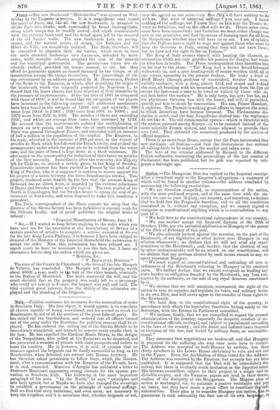Stahl.—Cialdini continues his measures for the restoration of order in
Southern Italy. His first object, it would appear, is to conciliate all classes capable of being conciliated, and his second to crush the Bourbonists by aid of all the sections of the great Liberal party. He has called out the Garibaldians, and ordered that all officers turned out of the army under the Bourbons for political reasons shall be re- placed. He has ordered the calling out of the Gardia Mobile to be immediately completed, and intends to remove every syndic slack in the task. He has expelled the Cardinal Riario Sforza, to the delight of the Neapolitans, who yelled at his Eminence as he departed, and has presented a number of priests with their passports and orders to leave the country. He is, however, it is said, of opinion that no measure against the brigands can be finally successful so long as the Bourbonists, when defeated, can retreat into Roman territory. He has therefore asked permission to follow them, which the Govern- ment, after a communication with the Emperor of the French, have, it is said, conceded. Massimo d'Azeglie has published a letter to Professor Manteucci expressing, strong distaste for the system pre- vailing in Southern Italy. The following is the most important paragraph of his note. "In the North," he says, "principles and acts have agreed, but at Naples we have also changed the sovereign to establish a government on the principle of universal suffrage. Still we find that sixty battalions, and even more, are necessary to keep the kingdom, and it is notorious that, whether brigands or not,
they arc agreed on one point—viz. that they will have nothing to do with us. But what of universal suffrage ? you may ask. I know nothing of the suffrage, but I know that on this side the Tronto we want no battalions, and on the other side we do. Hence some error must have been committed ; and therefore we must either change our acts or our principles, and find the means of learning once for all from the Neapolitans whether they will have us or not. I am of opinion that the Italians have a right to wage war against those who want to keep the Germans in Italy, seeing that they will not have them; but we have not the right to fire on Italians."
The King of Italy amuses himself with hunting the chamois, an occupation which not only gratifies his passion for danger, but tends to keep him in health. The Times correspondent thus describes him on his way to the chase : "The King had a brown broad-brimmed wideawake on, and a grey bunting-suit of coarse woollen cloth all of one colour, agreeably to the present fashion. He look4 a kind of Bluff Henry (though guiltless of uxoricides), stouter than ever, awfully sunburnt, with a deep, almost livid, red round and behind the ears, all bristling with his moustaches, stretching from the lips all across the face—not a man to be loved or valued by those who do not look below the surface." He is only forty, but gets too fat, and his physicians threaten him with the lancet, and will, if permitted, quietly put him to death by venesection. His son, Prince Hambert, is eighteen. The Premier is making great efforts to improve the army, in which desertions have become frequent. The Piedmontese dis- cipline is strict., and the lazy Neapolitans drafted into the regiments do not like it. The old commissariat system—which is identical with the system pursued among Sepoys—is to be restored instead of the more scientific French system, and troops allowed to provide their own food. They detested the monotony produced by the system of official supplies.
There is no news from Rome, except that the Pope has created four new cardinals—all Italians—and that the Government has ordered all talking-birds to be seized in the market and taken away. The text of the circular addressed by Ricasoli to the different Italian embassies, recounting the proceedings of the last session of Parliament, has been published, but its pith was reported by tele- graph a fortnight ago.






























 Previous page
Previous page